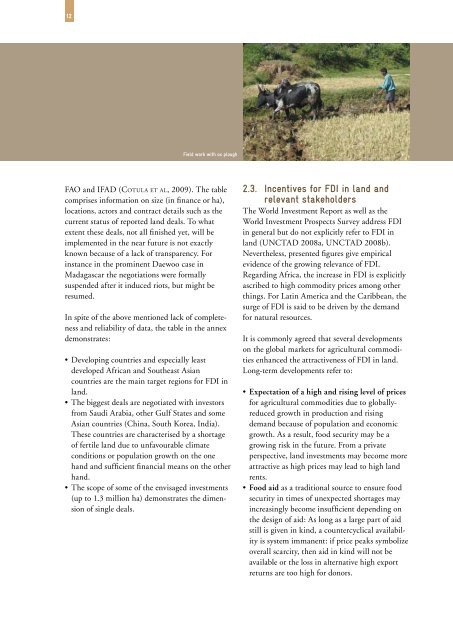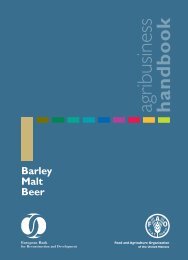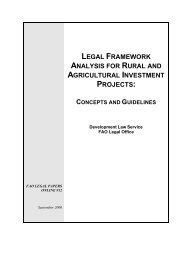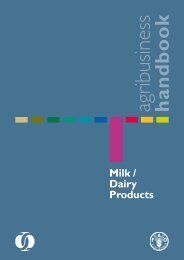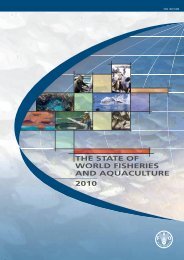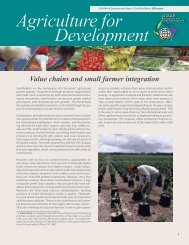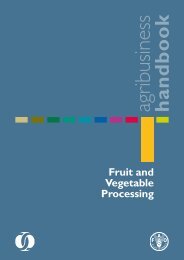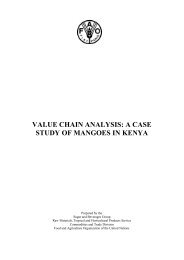Foreign Direct Investment (FDI) in Land in developing countries
Foreign Direct Investment (FDI) in Land in developing countries
Foreign Direct Investment (FDI) in Land in developing countries
- No tags were found...
Create successful ePaper yourself
Turn your PDF publications into a flip-book with our unique Google optimized e-Paper software.
12Field work with ox ploughFAO and IFAD (Cotula et al, 2009). The tablecomprises <strong>in</strong>formation on size (<strong>in</strong> f<strong>in</strong>ance or ha),locations, actors and contract details such as thecurrent status of reported land deals. To whatextent these deals, not all f<strong>in</strong>ished yet, will beimplemented <strong>in</strong> the near future is not exactlyknown because of a lack of transparency. For<strong>in</strong>stance <strong>in</strong> the prom<strong>in</strong>ent Daewoo case <strong>in</strong>Madagascar the negotiations were formallysuspended after it <strong>in</strong>duced riots, but might beresumed.In spite of the above mentioned lack of completenessand reliability of data, the table <strong>in</strong> the annexdemonstrates:• Develop<strong>in</strong>g <strong>countries</strong> and especially leastdeveloped African and Southeast Asian<strong>countries</strong> are the ma<strong>in</strong> target regions for <strong>FDI</strong> <strong>in</strong>land.• The biggest deals are negotiated with <strong>in</strong>vestorsfrom Saudi Arabia, other Gulf States and someAsian <strong>countries</strong> (Ch<strong>in</strong>a, South Korea, India).These <strong>countries</strong> are characterised by a shortageof fertile land due to unfavourable climateconditions or population growth on the onehand and sufficient f<strong>in</strong>ancial means on the otherhand.• The scope of some of the envisaged <strong>in</strong>vestments(up to 1.3 million ha) demonstrates the dimensionof s<strong>in</strong>gle deals.2.3. Incentives for <strong>FDI</strong> <strong>in</strong> land andrelevant stakeholdersThe World <strong>Investment</strong> Report as well as theWorld <strong>Investment</strong> Prospects Survey address <strong>FDI</strong><strong>in</strong> general but do not explicitly refer to <strong>FDI</strong> <strong>in</strong>land (UNCTAD 2008a, UNCTAD 2008b).Nevertheless, presented figures give empiricalevidence of the grow<strong>in</strong>g relevance of <strong>FDI</strong>.Regard<strong>in</strong>g Africa, the <strong>in</strong>crease <strong>in</strong> <strong>FDI</strong> is explicitlyascribed to high commodity prices among otherth<strong>in</strong>gs. For Lat<strong>in</strong> America and the Caribbean, thesurge of <strong>FDI</strong> is said to be driven by the demandfor natural resources.It is commonly agreed that several developmentson the global markets for agricultural commoditiesenhanced the attractiveness of <strong>FDI</strong> <strong>in</strong> land.Long-term developments refer to:• Expectation of a high and ris<strong>in</strong>g level of pricesfor agricultural commodities due to globallyreducedgrowth <strong>in</strong> production and ris<strong>in</strong>gdemand because of population and economicgrowth. As a result, food security may be agrow<strong>in</strong>g risk <strong>in</strong> the future. From a privateperspective, land <strong>in</strong>vestments may become moreattractive as high prices may lead to high landrents.• Food aid as a traditional source to ensure foodsecurity <strong>in</strong> times of unexpected shortages may<strong>in</strong>creas<strong>in</strong>gly become <strong>in</strong>sufficient depend<strong>in</strong>g onthe design of aid: As long as a large part of aidstill is given <strong>in</strong> k<strong>in</strong>d, a countercyclical availabilityis system immanent: if price peaks symbolizeoverall scarcity, then aid <strong>in</strong> k<strong>in</strong>d will not beavailable or the loss <strong>in</strong> alternative high exportreturns are too high for donors.


